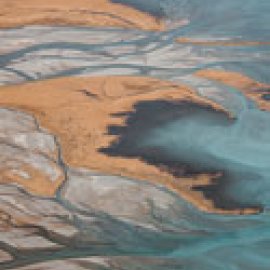Peatlands
-
English
-
ListenPause
[intro music, ocean sounds]
Welcome to World Ocean Radio…
I’m Peter Neill, Founder of the World Ocean Observatory.
In our definition of ocean, water descends from the mountaintop and flows across and through land systems to descend to the coast and admixture deep down to the abyssal plain before evaporating up through the atmosphere to ascend and maintain the extraordinary natural process and value of the global water cycle and its contribution to the health and sustainability of human endeavor. It is the basic turn of the wheel of life.
An unheralded stage in that cycle are peatlands, bogs, swamps and wetlands that are, in effect, saturated land, often untouched but necessary to the global process, the maintenance of a unique biodiversity, and measurable contribution to the assimilation and support of those human interventions that are essential, even if we are ignorant of their locus or function. They are places apart, often dark, sometimes dangerous, often mythologized, where may exist storied creatures and magic kingdoms, real or imagined, where is it is best for us not to tread. Peatlands exist in 180 countries: primarily in the northern and tropical zones. Russian and Canada have the largest inventory by far, over a million acres each, followed in lesser amounts by Indonesia and the US. Recently vast new deposits have been discovered in the Congo Basin and Peru. Peatlands support a prolific inventory of exotic, often endangered plants and animals; they control and purify our freshwater; they protect from groundwater flooding, and they sequester vast amounts of carbon in the form of decomposed organic matter and emissions.
They have been threatened primarily by harvest for fuel, drained and filled for agriculture, displaced by rural and suburban sprawl, and with increasing drought conditions are susceptible to fire. In each case, the cost measured by carbon release and loss of ecosystem service adds directly to the growing challenge of climate change, although these factors are mostly omitted from the calculation.The irony is that unprotected, as with so many other natural resources, their consumption contributes to a growing worldwide problem, while their conservation does the dramatic opposite by sequestering carbon, enabling wildlife, filtering water, and protecting adjacent human settlement and use. As with other such natural resources, there is an international collaboration of some governments, UN agencies, and environmental organizations advancing protection through research, some government initiative, draft agreements and treaties, and calls to action.
Peatlands join the catalogue of man-made threats to Nature, along with the poisoning of wild inland rivers, the pollution of islands and unsettled coasts, the compromise of clean air we need to breathe, and the all the other manifestations of the water world in which we live that are so necessary for human survival.Even our cities are not immune, built often at the intersection of waterways or on filled land. My former office in New York City stood on a foundation of wooden piles driven into the mud of the East River shore. The adjacent Brooklin Bridge and the underground subway transportation system were engineered through bedrock, swamp, sand beds and constructed stone structures underwater on the bottom of a river thr ough which passes an enormous volume of water as forceful current and reversing tide, natural barriers overcome by responsive technology, financial scale, exponential social demand, and inexorable growth.
Does anyone care? Surely not the energy companies, corporations, banks, hedge funds, and market investors; their disinterest is evident and accelerated when government loses any will to enforce standards and regulations and there is not enough moral suasion or informed engagement by investors and others to contradict the short-term profit motive, climate change be damned. One can, perhaps ought, to be very cynical about how quickly the best intentions and sustainability progress of the last decade has been abandoned.Peatlands are time banks; they contain hidden detritus of natural life. Sometimes archaeologists find in them human remains – a lost wanderer who strayed off the beaten path, a family trapped in an unforeseen inundation and preserved in an unknown moment of tragedy. I find those discoveries emotional and truth-telling: human lives lost, suddenly remembered, caught in final extremis with a story untold, now revealed as a terminal mistake. Our indifference to the laws of Nature, our betrayal of those verities, are just pride -- egotistical, even suicidal. In my most cynical moments, I see us standing on the edge of such an innocent and dangerous space, on the brink of thoughtlessness and error that will leave us and so many others buried in the mud of a lost civilization.
We will disuss these issues and more, in future editions of World Ocean Radio.
WORLD OCEAN RADIO IS DISTRIBUTED BY THE PUBLIC RADIO EXCHANGE AND THE PACIFICA NETWORK, FOR USE BY COLLEGE AND COMMUNITY RADIO STATIONS WORLDWIDE. FIND US WHEREVER YOU LISTEN TO PODCASTS, AND AT WORLD OCEAN OBSERVATORY DOT ORG, WHERE THE FULL CATALOG OF MORE THAN 700 RADIO EPISODES IS SEARCHABLE BY THEME.
[outro music, ocean sounds]Peatlands, bogs, swamps, and wetlands are uniquely biodiverse natural spaces: soft coastal barriers that make immeasurable contributions to the health and sustainability of human endeavor. Left unprotected, their consumption contributes to a growing worldwide problem; conserved, they sequester carbon, enable wildlife, filter water, and protect us from coastal inundation.
About World Ocean Radio
World Ocean Radio is a weekly series of five-minute audio essays available for syndicated use at no cost by college and community radio stations worldwide. Peter Neill, Founder of the World Ocean Observatory and host of World Ocean Radio, provides coverage of a broad spectrum of ocean issues from science and education to advocacy and exemplary projects.
World Ocean Radio
15 Years, 760+ Episodes
Ocean is climate
Climate is ocean
The sea connects all things
- Login to post comments



